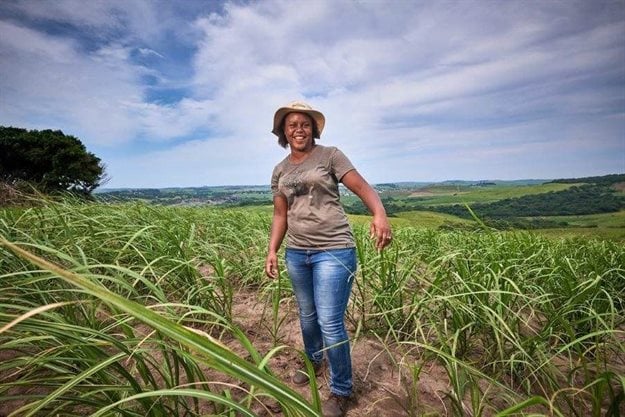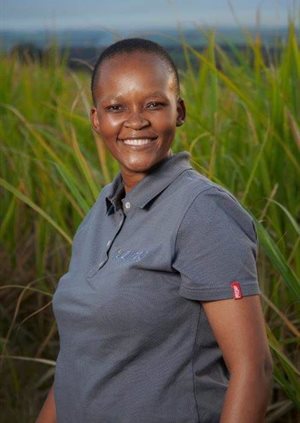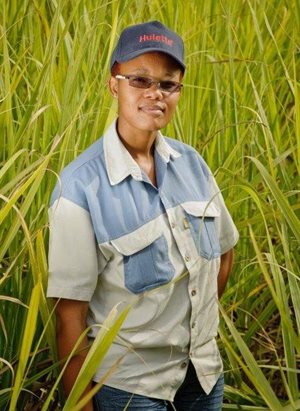Nonhlanhla Gumede-Shabalala, owner, Uthandimvelo Farm

Nonhlanhla Gumede-Shabalala is the owner of Uthandimvelo farm in KwaZulu-Natal and has been working in the agricultural sector for about nine years. “My father has been farming for over 40 years. He bought his 90.3-hectare farm when I was in matric. My passion for agriculture was ignited in earnest through working and assisting my father with his operation,” said Gumede-Shabalala. She started her career in the banking sector and left around 2010 to work with her father.
In 2017, Gumede-Shabalala bought Uthandimvelo Farm using bank finance. It’s a 170-hectare farm with approximately 112-hectares under sugarcane, with the remaining section the farm surrounded by a large forest. Gumede-Shabalala has several other business lines other than sugarcane farming, including growing vegetables and supplying local supermarkets and schools with fresh produce and sheep breeding.
In terms of schools, she is a preferred service provider for the KZN Department of Education under the provincial school feeding scheme and supplies specific schools with fresh vegetables during the schooling season. The KZN Education Department feeds approximately 2.4 million children through the school feeding scheme. At least 1.3 million of these children are vulnerable. The service provided by Gumede-Shabalala ensures that these learners get a nutritious meal while they are in school.
The sugar industry has a nine-months season which means that the vegetable production and sheep breeding businesses keep her busy throughout the 12 months and she is able to generate further income for the business.
Uthandimvelo consists of 10 permanent staff members and 14 seasonal workers. During the 2019/20 season, the farm delivered some 3,000 tonnes of sugarcane. Gumede-Shabalala had to learn the agricultural business very quickly. “Having purchased the farm through a financial institution, I had to make sure that I pay the bond and hire contractors to assist with the harvesting of cane. It was even difficult to purchase fertiliser or pay workers," she says.
She persevered until things started turning around. “I have been able to secure grant funding which allowed me to buy much-needed equipment. The farm is almost fully operational. The farm now employs more seasonal workers to assist with the various activities within the farm.”
In 2019/20, Tongaat Hulett made a strategic decision to exit its direct sugarcane farming activities in South Africa. The company facilitated the creation of Uzinzo Sugar Farming, which means stability in isiZulu, with three previously disadvantages individuals selected to be at the helm of the organisation, one of whom was Gumede-Shabalala.
Uzinzo has enabled its shareholders to lease three prime agricultural estates at rentals below market-related rates. The leased area is approximately 3,900 hectares with an estimated annual production of some 160,000 tonnes of sugarcane at the scale which makes Uzinzo Sugar Farming one of Tongaat Hulett’s top five largest supplying growers.
Uzinzo Sugar Farming was officially launched in October 2019 and Gumede-Shabalala and the other directors of the company had to hit the ground running to ensure that operationally, the company delivered the forecasted tonnages and ensure the smooth running of the various operations.
“Uzinzo has allowed me to grow and learn from my colleagues who have considerable experience in farming. As an Uzinzo board member and trustee in the Uzinzo Permanent Employee Share Trust, I had to familiarise myself quite quickly with all the legislative requirements and governance issues pertaining to Uzinzo and trusts. I had to learn to have my say during meetings.”
She says Uzinzo has also allowed her to improve her leadership skills. “I am constantly expected to provide strategic guidance on issues; delegate tasks; motivate people and solve administrative issues. There are huge opportunities in farming, especially for women. We can get grant funding. We can supply our produce to the various markets. It’s a win-win for all of us.”

Zibo Makhaye knew from an early age that she would pursue a career in agriculture. Makhaye was born in Mtubatuba (Northern KwaZulu-Natal) where agriculture is a way of life. Her father, a teacher by profession, owned a 10-hectare sugarcane farm. “We used to wake up early in the morning to weed and spray chemicals. My father used to tell me that money was in the soil and not in some fancy office. I decided at that young age that I would pursue a career in farming."
Makhaye attended Bongubuhle Primary School and then went to Madwaleni High School in Mtubatuba. Soon after finishing her Grade 12, she was accepted at the CEDARA College of Agriculture in Pietermaritzburg to pursue her studies in Plant Production. On completion of her national diploma, she applied and was accepted to attend the senior certificate course in sugarcane agriculture which is facilitated through the South African Sugar Research Institute (SASRI).
From 2006 to mid-2007, this 34-year-old worked for the KZN Department of Agriculture and Rural Development on an outreach programme for small-scale farmers, and then she joined Tongaat Hulett. She started out as a trainee at Tongaat and was later appointed as an assistant farm manager. In October 2019, she was employed by Uzinzo Sugar Farming as a farm manager.
In her new role, Makhaye is responsible for the daily planning, organising, supervising and administration activities on the farm. “My typical responsibilities include forward planning, making sure that work progresses optimally, keeping an eye on expenditure on the farm; ensuring compliance with government regulations, health and safety standards. I am also responsible for ensuring that the farm is profitable and meets the projected financial targets,” says Makhaye.
She is responsible for some 273 seasonal workers and five permanent employees. “The main challenge that I faced in my career has been working in an environment that is typically known as a men-only environment. I had to deal with people not trusting my leadership due to my age and gender, more especially older men. I had to double my efforts and prove myself.
“The immediate thing that I have achieved in my current role as a farm manager is that it has brought my confidence back. My leadership skills have been put on display. The ability to solve issues with employees always brings pleasure. To manage such a huge farm, 2,600 hectares of the 3,900 hectares, is an achievement on its own. To see Uzinzo making profit is the cherry on the top,” says Makhaye.
Makhaye strongly believes there is space for women in agriculture. “To the young girls, I would like to say that they should not be scared to get their hand dirty. Believe in themselves. The secret is not to rush for success. They should be willing to wait for the results. Shortcuts are not an option in agriculture. I would also like to encourage other young women in the agricultural sector not to give up easily – it will not always be smooth, there will be challenges. However, love what you are doing, have passion. If need be, be prepared to work extra hours and go an extra mile without expecting to be compensated.”

Nosisa Dube regarded sugarcane agriculture as one of the key activities within her community. After all, her grandfather was a small-scale grower delivering sugarcane to Tongaat Hulett. Dube never imagined that one day she would be working within the agricultural sector. Dube is 30 years old and has four other siblings. She attended Wangu Primary School under the Mandeni Municipality and then moved to Stanger High School to complete her Grade 12.
Soon after completing her final year, she registered for a Diploma in Agriculture Management with the University of South Africa (Unisa). Dube was attracted by the broadness of the agricultural industry. She had great interest in exploring the different components of the sector and is fascinated by how a seed grows.
Her registration with Unisa coincided with Tongaat Hulett entering in 2011/12 into a working arrangement with the Ntwashini Community Trust to accelerate the sugarcane development initiative. The Ntwashini claimant community had successfully claimed for the restoration of land rights in terms of the Restitution Land Rights Act of 1994. A total of 1 200-hectares was restored to the community and approximately 400-hectares was dedicated to sugarcane development. Tongaat Hulett continues to have a working relationship with the trust. In 2019/20, the trust delivered 30,119 tonnes, created 125 jobs and paid R5.2m in wages.
One of the key pillars of the working agreement between Tongaat Hulett and the Ntwashini Community Trust was the education and training and capacity building programme. The trustees wanted to ensure that while Tongaat Hulett was assisting with the implementation of the sugarcane development programme, there was also a transfer of skills to youth in the community. Dube was identified as a recipient of the education and training and capacity building programme.
In 2013, Dube was sponsored by Tongaat Hulett to attend the junior certificate course in sugarcane agriculture. She was also sponsored in 2015 to attend the senior certificate course in agriculture. The junior certificate course is a three-week course which seeks to introduce students to sugarcane agriculture while the senior course is a five-week intense programme seeking to produce specialists in sugarcane agriculture. Both courses were provided by the South African Sugar Research Institute.
After completing her studies, Dube was registered as a student intern within Tongaat Hulett. The objective was to expose her to the various dynamics of working in sugarcane estates while also ensuring that she completed with her diploma with Unisa. Dube was further seconded to participate in the implementation of the communal leasehold model which focused on the establishment of sugarcane in 12,000 hectares in communal areas. This initiative was implemented in partnership with Simamisa – a farming management company.
She was officially integrated into the Simamisa team in 2012. Her commitment and work ethic ensured that Dube has moved up the company ranks. She was promoted in 2015 into the role of the junior farm assistant where she is responsible for 350 hectares under sugarcane in communal land. Her role involves directing and coordinating 23 seasonal workers into various activities including planting, chemical application and harvesting. She engages with the cooperative members on the various extension issues impacting on their individual sugarcane plots. She also attends, in conjunction with the chairpersons of the respective cooperatives, to issues presented to the traditional leadership structures.
“Within my role, I have achieved great knowledge and experience in sugarcane production. I have also gained understanding of the culture of farming within different communities,” says Dube. “Many women are reluctant to venture into agriculture because it is a male-dominated sector. My advice to young women wanting to pursue studies in agriculture is that they should never hesitate to start small whilst dreaming big. Make the most of any opportunity that presents itself. Nothing will come to them; young women in agriculture need to get up and go get it.”